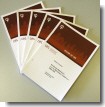| Oficina do CES | ||||
|
|
||||
|
|
325 Data de publicação: Junho de 2009 |
|||
Resumo: This paper examines the impact of World War II in the home front as represented in short‐stories published in the U.S. wartime journal Common Ground. Published between 1940 and 1949, the magazine combined literature and social and cultural critique in its progressive analysis of matters of race, immigration, citizenship, and civil rights. Although Common Ground’s intellectual community committed itself to protect unity at the home front, it published complex representations of the theme of homecoming in particular, conveying instances of latent violence at the national level that challenged the sense of ‘homeliness.’ The analysis attempts a combination of theories of the nation with Gaston Bachelard’s considerations on the poetics of space and Sigmund Freud’s notion of the uncanny. |
||||
